Energy drinks can help supply a brief boost of energy along with an increase in concentration.
While it’s pretty easy to find energy drinks in the US, it’s the other way around in Korea, though these beverages have been increasing in popularity among the older adults there.
While energy drinks aren’t entirely commonplace in Korea, there are a few decent local and international brands worth sharing with everyone else.
So, if you happen to be residing in Korea or just want to try something different for a change, stick around for a detailed discussion on what to expect from energy drinks in general, to a few awesome picks that might appeal to your tastes.
Let’s get to it!
What Do Energy Drinks Contain?
Energy drinks can contain an assortment of ingredients that vary from brand to brand.
Some energy drinks could have electrolytes and herbal extracts, while others could only contain caffeine, sugar, and vitamins.
While these drinks can have different ingredients, there are a few that are always included in them, such as caffeine and B vitamins.
I’ll be going deeper into the common ingredients found in energy drinks in the section below:
Caffeine
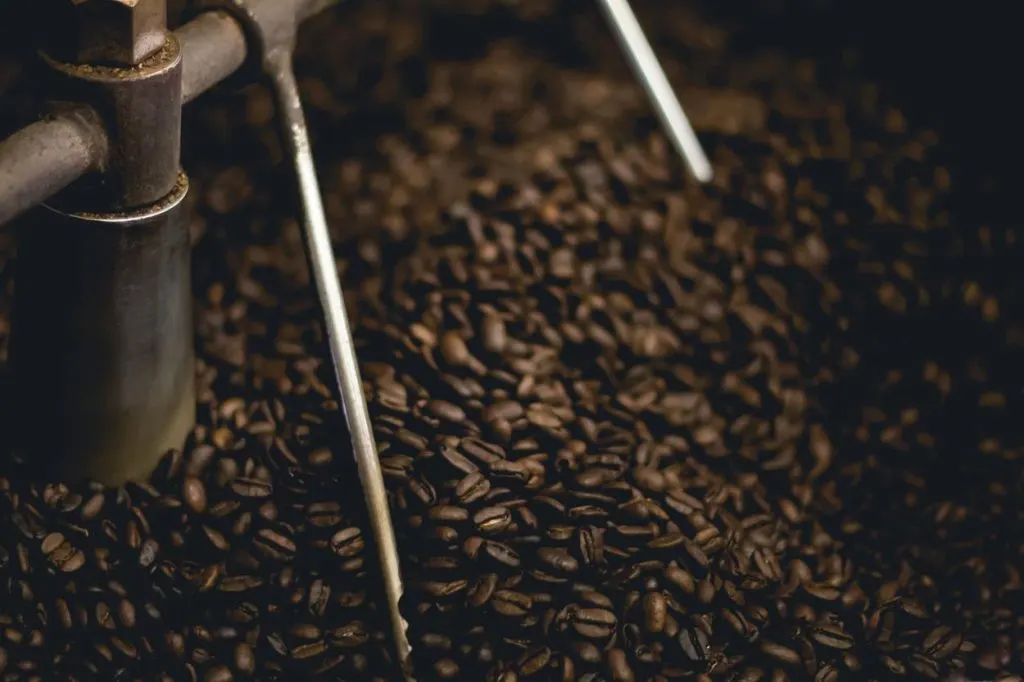
Caffeine is one of the major ingredients in energy drinks, giving you the energy boost you need to increase your performance.
Caffeine is a natural stimulant that works by binding to the adenosine receptors in your brain, thereby making you feel more awake and less fatigued.
Aside from being commonly found in natural sources such as tea leaves, coffee beans, and cacao plants, caffeine can also be produced synthetically.
Caffeine has a number of benefits, from reducing the symptoms of fatigue to enhancing exercise performance.
Energy drinks typically have between 50mg to 300mg of caffeine depending on the brand, catering to various levels of caffeine tolerances. After all, everyone metabolizes caffeine at different speeds.
That said, caffeine shouldn’t be consumed excessively.
The FDA recommends an everyday caffeine intake limit of 400mg for healthy adults. Anything else than that, and you may wind up with unpleasant impacts like:
- dehydration
- dizziness
- headaches
- restlessness and shakiness
- rapid heart rhythm
Hence, be sure to know your personal limits and make the right choices when you’re picking out your energy drinks.
Sugar
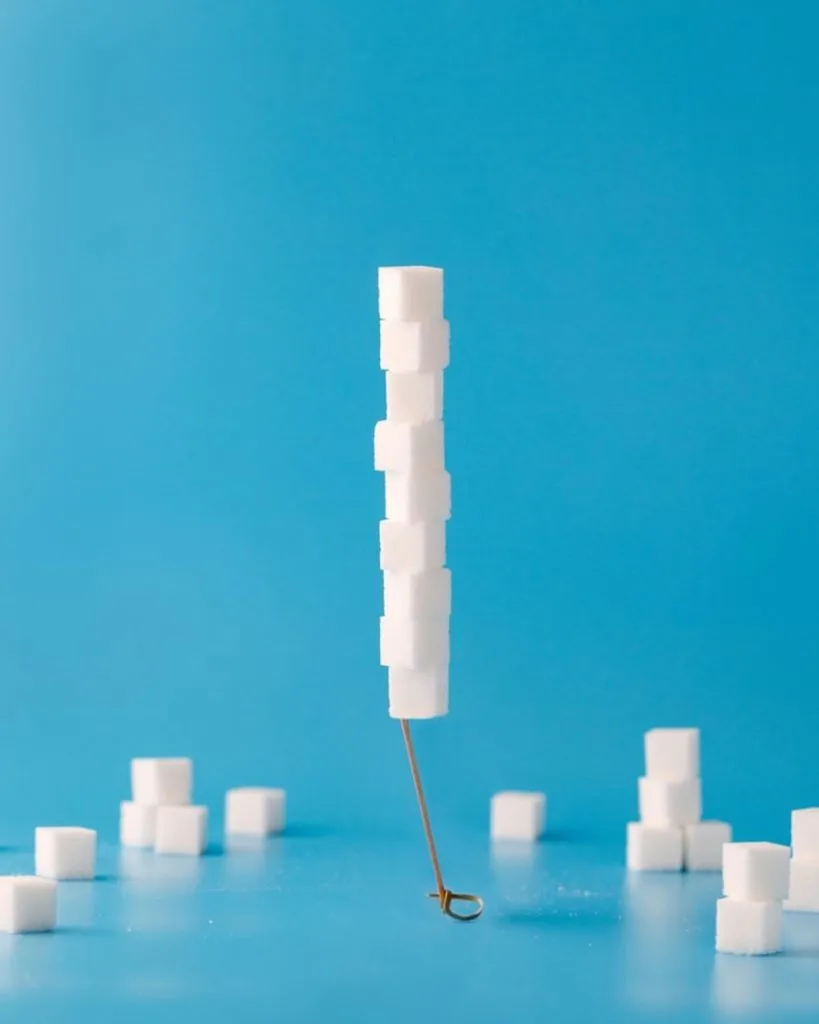
While it’s not a staple ingredient in all energy drinks, sugar is typically included in these beverages to enhance their flavor and taste.
Generally, it’s perfectly okay to have sugar sometimes, as it can increase your mood and fuel your brain, but once you start consuming it in excess, that’s when sugar becomes unhealthy for you.
For reference, the AHA recommends a daily sugar intake of no more than 25g and 36g for women and men; respectively.
Many energy drinks can have an outrageous amount of sugar in each serving. For example, a single 16 fl. oz can of Full Throttle contains 55g of sugar, which definitely exceeds the daily limit.
A diet fairly high in sugar can lead to serious health problems in the long run, such as:
- cardiovascular diseases
- diabetes
- weight gain
- high blood pressure
- acne
Fortunately, sugar-free energy drinks are widely available nowadays and make healthier alternatives to sugary ones.
In brief, there’s nothing wrong with drinking sugary energy drinks, but make sure to take care of your health at the same time, or go for beverages with a lower sugar content.
Vitamins and Minerals
Energy drinks have many types of vitamins and minerals. The most common minerals and vitamins in these drinks are sodium and B vitamins.
Minerals and vitamins are usually added to energy drinks with the purpose of increasing their overall nutritional values, though it’s debatable how effective they are since the ingredients are stated to be in trace amounts.
For a more detailed explanation of B vitamins and their functions, check out this article about it on the Harvard website.
I’ve prepared an easy-to-read table about the B vitamins that are typically found in energy drinks below:
| Types of B Vitamins | Purpose | Tolerable Upper Intake Level |
| Vitamin B3 (niacin) | Helps the body release energy; keeps the skin healthy. | 35mg |
| Vitamin B6 | Store energy from protein and carbohydrates; formation of red blood cells. | 100mg |
| Vitamin B12 | Release energy from food; structures red blood cells; retains the nervous system sound. | – |
Amino Acids
Amino acids are also another ingredient usually found in energy drinks due to their benefits in improving athletic performance.
Amino acids are important as they’re responsible for the creation of proteins, which help your body, metabolize food and repair body tissues. Your body also uses amino acids as a source of energy.
Some of the types of amino acids that you’ll find in energy drinks are taurine and BCAAs.
Taurine is a naturally-occurring amino acid that plays a role in many bodily functions and has lots of benefits, which include protecting certain organs like the heart and enhancing physical performance.
On the other hand, BCAAs (Branched-chained Amino Acids) are essential amino acids and can be absorbed into the body through foods like meat and fish.
Like taurine, BCAAs are also significantly advantageous in improving exercise performance, from reducing fatigue and increasing muscle mass.
Amino acids in energy drinks may be useful if you regularly engage in strenuous physical activity, but they probably won’t make much of a difference if you just consume them for fun.
Do Energy Drinks Improve Athletic Performance?
Energy drinks can improve athletic performance. mostly due to the caffeine within them.
If you need an extra boost for your workouts or sports activities, an energy drink is a way to go. After all, caffeine has been proven to increase physical performance in numerous studies.
A study involving 15 participants found that the ingestion of a Red Bull significantly improved upper-body muscle endurance.
Plus, caffeine can also help enhance your mental focus, helping you to stay on track with your reps or goals during your workouts or sports activities.
Of course, be sure to stick to a tolerance personal limit and consume energy drinks in moderation.
For this reason, you should have an energy drink at least half an hour before heading out onto the field if you want to feel its beneficial effects.
Does Caffeine Boost Brain Function?
Caffeine can indeed boost brain functions like mental concentration and vigilance.
Aside from physical performance, caffeine has positive impacts on your cognitive functions as well, helping you to focus better and learn more.
A 2016 study discovered that moderate doses of caffeine enhanced alertness, vigilance, attention, and reaction time.
Thus, if you have trouble focusing on your studies, you can have an energy drink to help you pay attention better.
Of course, be sure to choose your energy drinks wisely so you won’t end up with a sugar crash at the end of the day instead.
Can I Have An Energy Drink Before Working Out?
You can certainly have an energy drink before working out. Personally, I’d suggest having your pick-me-up around half an hour before you start your exercise sessions.
Consuming an energy drink before you start your workouts can significantly enhance your performance. Though to get the best results, you should have your energy drink between 30 to 45 minutes before you exercise.
This is due to the fact that caffeine levels in your bloodstream will start to peak around 15 to 45 minutes after consumption. It’s around this time that the stronger effects of caffeine will start to set in, and you’ll experience an increase in alertness as well as mental focus.
Best Energy Drinks In Korea
| Brand | Caffeine Content (mg) | Sugar Content (g) | Calories |
| Bacchus-D | 30mg | 12g | 56 |
| Red Bull | 80mg | 27g | 110 |
| Monster | 160mg | 54g | 190 |
| REIZE | 50mg | 0g | 11 |
Bacchus-D
A homegrown energy drink brand in Korea, Bacchus-D is dubbed the local ‘Red Bull’ due to its similar taste to the latter however with a few differences in appearance and ingredients.
Unlike regular pick-me-ups, Bacchus-D comes in 3.4fl. oz bottles and contains 30mg of caffeine, 12g of sugar, and 56 calories.
Plus, this drink is also filled with a whopping 2,000mg of taurine and lots of B vitamins for better physical as well as cognitive performance.
However, due to the high content of taurine and other ingredients, Bacchus-D isn’t recommended for anyone below the age of 15.
While Bacchus-D may come in a smaller size, don’t let it fool you: it has plenty of nutrients to supply you with a healthy boost without overdoing it.
Bacchus-D Energy can be easily purchased online through websites like Amazon, eBay, and HEB.
Red Bull
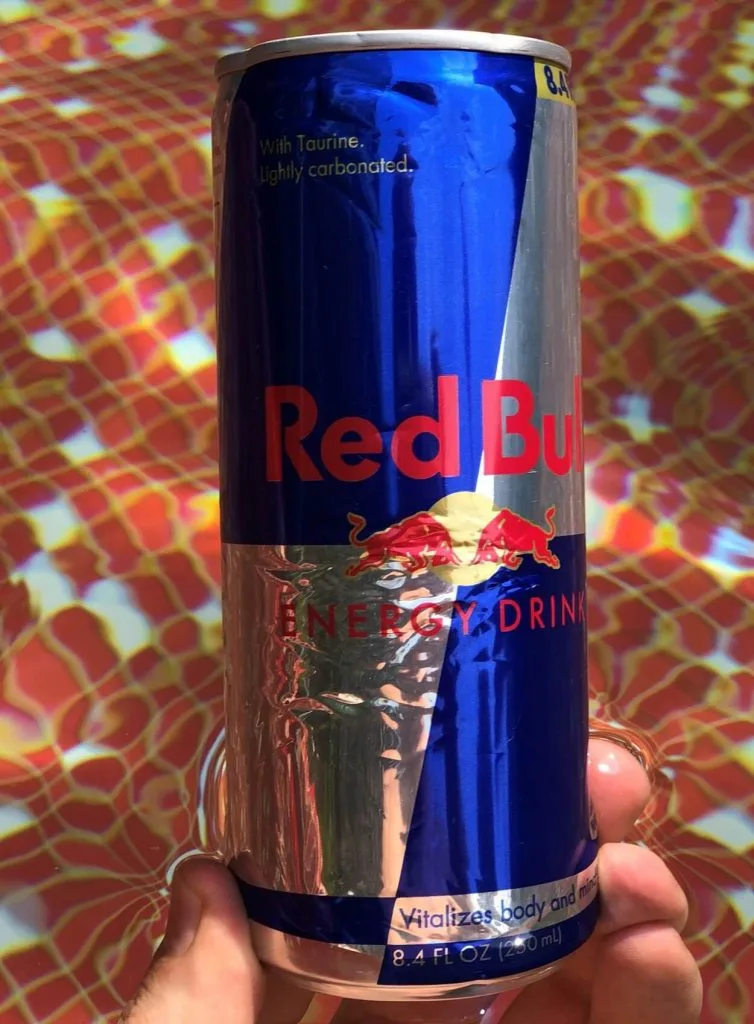
With its solid reputation and amazing flavors, it’s no surprise that Red Bull is one of Korea’s favorite international picks when it comes to energy drinks.
A single 8.4fl.oz serving of Red Bull comes with 80mg of caffeine, 27g of sugar, and 110 calories. If you happen to have a low caffeine tolerance, Red Bull would be perfect for you.
But if you prefer your coffee on the stronger side, you might need to have a few cans before the caffeine kicks in.
Another perk to Red Bull is the fact that it has an extensive variety of flavors, thus you won’t be getting bored with this brand anytime soon.
The downside to this drink is that it contains quite a large amount of sugar and calories. Not a big deal if you regularly work out, but if you’re more of the slow-paced type, you should either only have Red Bull sometimes or go for energy drinks with less sugar.
For a more in-depth discussion of what Red Bull contains, you can read all about it in my Red Bull Energy Drink Caffeine & Ingredients article.
Monster
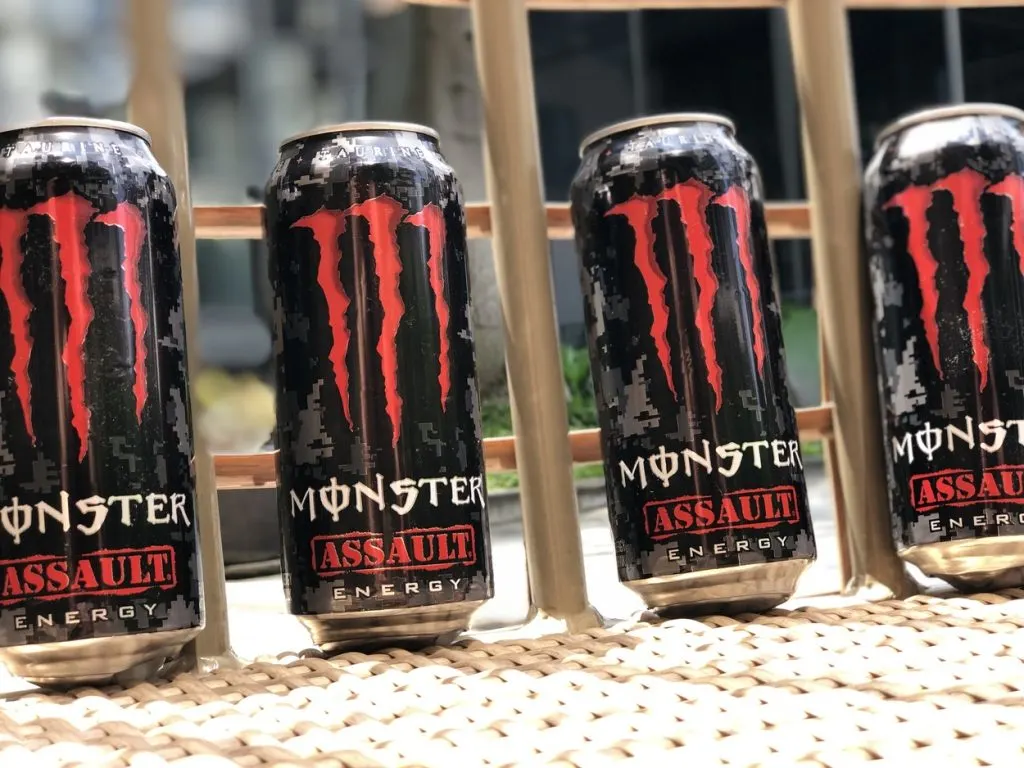
If you think that Monster isn’t popular in Korea, you’re in for a treat. Monster Energy, along with its other variations like Monster Assault and Khaos, can be found in plenty of stores or even purchased online to be shipped to Korea.
For reference, 16fl.oz can of Monster has 160mg of caffeine, 54g of sugar, and 190 calories. With its moderate caffeine content, Monster can provide you with enough energy for any activity of the day,
Plus, Monster is packed with lots of vitamins and other nutrients that help give you an extra edge in performance.
The drawback is that Monster has a high sugar and calorie content, which is pretty unfavorable if you’re on a diet or have a more sedentary lifestyle.
Overall, Monster is good to drink, but if you’re really keen on this drink, you should either have it occasionally or make sure you exercise often to burn those calories off.
If you’re wondering how well Monster works like an energy drink, check out my Monster Energy Drink Review article, which details my experience with it.
REIZE (10 Out Of 10)
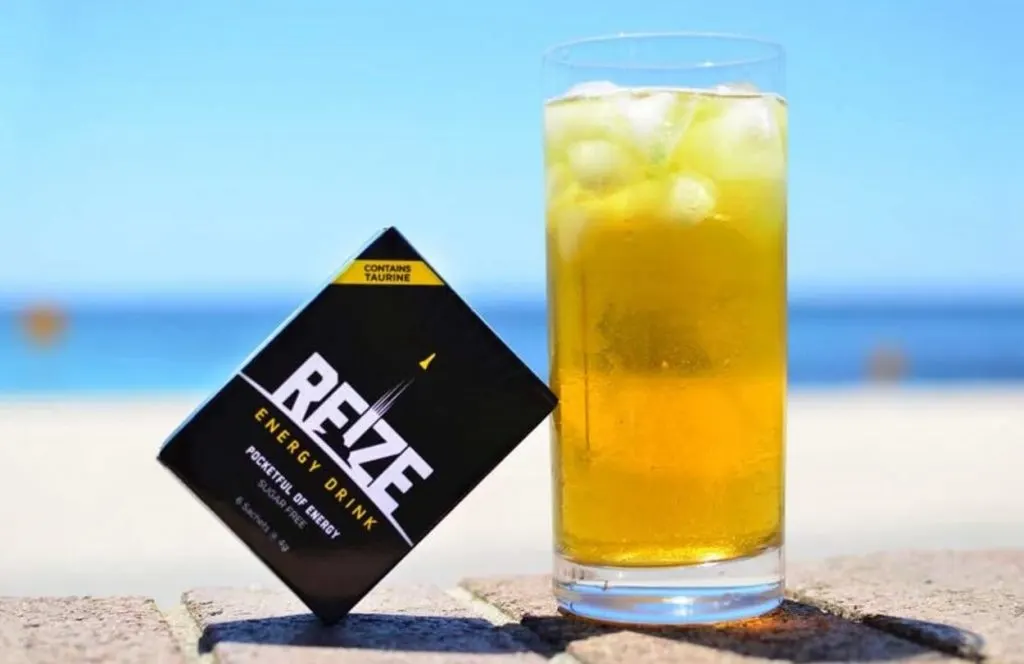
REIZE is a powdered energy drink that comes in light and convenient 4g sachets. With a sensible 50mg of caffeine, REIZE is also sugar-free and has only 11 calories.
Besides, REIZE contains a smart blend of beneficial ingredients like 1000mg of taurine, ginseng, and B-group vitamins that work together to provide you with the perfect energy boost without the dreaded sugar crashes.
The best part is that REIZE ships to your home for only around $1 per sachet, which is amazing value for money.
Give REIZE a try, and you might agree that it’s the smarter option to complement your lifestyle.

